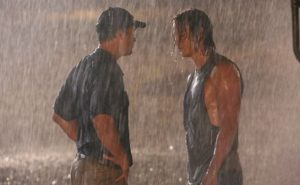Since my husband and I married some decades ago, we’ve never owned a television. That used to be saying something: now not so much because any show can be streamed over any electronic device, and we do have a few of those. Still, the very idea of owning an entire TV series would have never occurred to me until I fell hard for Friday Night Lights. I have friends who never tuned in to FNL because they hate football. But as any fan will tell you, It’s not about football! The game is the metaphor. What the show is really about is fatherhood.
Okay, maybe not all about. But after watching every episode at least three times, I’m struck by the full spectrum of father-son relationships:
- Billy and Tim Riggins’ father is a deadbeat, forcing Billy to be a substitute dad for Tim—a role he’s

Behind every successful man is a good woman. no way ready for.
- Matt Saracen’s father has a tough time with relationships, bonding with the U.S. Army instead of his son.
- Jason Street’s father has a great relationship with his son until tragedy strikes and throws them both into uncharted waters.
- Landry Clark’s father loves and supports him—almost to a fault.
- Brian “Smash” Williams’ father met an untimely death, leaving a hole in the heart.
- J.D. McCoy’s father worships his boy’s talent but can’t accept his weaknesses.
- Vince Howard’s father is in jail, after planting a tangle of mixed emotions and resentment.
- Luke Cafferty’s father can’t understand his son’s need to break away .
Some of the girls have complicated relationships with their dads, too, especially Lyla Garrity, and mothers are more of an issue with Becky Sproles and Tyra Collette. Tami Taylor, school counselor and principal, mothers troubled students relentlessly. But the show is more about dads, mainly Tami’s husband Eric, the Coach.
Coach Taylor has no sons, only daughters, and his relationship with teenage daughter Julie is a particular challenge for him (to be fair, Julie would be a challenge for anyone). He’s by no means a perfect father, but at various times he supplies that need for Tim, Matt, Jason, Smash, Vince, Billy, and Luke. He’s the necessary presence to tell them to suck it up, to be a man, to push harder, to stand up, to stand down, to make it right. He’s a catalog of traits that in another context might be called Toxic Masculinity. He’s not one to cry, and when he can’t think of anything to say he says nothing. But he’ll be there. Every player on the team knows he can knock on the Coach’s door at any time of the day or night, and the Coach will be there, even if he chews them out first. If he makes a mistake, he’ll correct it sooner or later, and if trust falters he’ll gain it back.

Buddy Garrity, one of the most frustrating characters ever to appear on network television, is the big contrast. As a man with misplaced priorities—for him it really is all about football—Buddy fails at fatherhood spectacularly, first by driving away his wife and then by alienating his favorite daughter. Buddy is Eric’s foil throughout the series, his opposite in almost every respect: emotional, spiritually weak, untrustworthy, and conniving; more a wayward son than a father. But even he might be getting a grip on the fatherhood thing when his own son comes home. Likewise Billy Riggins, a father of three by series’ end, who has screwed up throughout all five seasons but at least picked a good role model in the Coach.
What’s a father? What can he do that a mother can’t? Mothers like Tami, Corinna Williams, and Katie McCoy provide emotional support. They cry and hug and plead. Every kid needs emotional support, but what the Coach provides is mind and will support. The keynote event of the first season, and in a way the whole series, is star-quarterback Jason Street’s unfortunate tackle that leaves him a paraplegic for life. In a single second, a young man’s strength is cut off at the knees, and it could happen to anyone. It does happen sooner or later—to everyone. That’s what a good father knows, and at the same time he knows that strength must be exercised. Not grimly, but joyfully: “There’s a joy to this game,” he tells his rookie team at the beginning of Season 4, just before they go out on the field and take the worst mauling of their lives.
Temperamentally, mothers make the home a place children can always return to, while fathers prepare their children to leave. Mothers teach security; fathers teach risk. “Give us all gathered here tonight the strength to remember that life is so very fragile,” the Coach prays after Jason’s accident. It’s a prayer repeated in the promotional video for the last season:
We are all vulnerable and we will all, at some point in our lives, fall.
We will all fall.
We must carry this in our hearts: that what we have is special,
that it can be taken from us, and when it is taken from us, we will be tested.
We will be tested to our very souls . . . .
It is these times, it is this pain, that allows us to look inside ourselves.
Coach Taylor has plenty of opportunity to look inside himself, and when he faces his own ultimate test (which is not what you think) he doesn’t fail. The decline in American fatherhood is well-documented and probably a big reason why the kids are so sad. They haven’t learned that strength is for testing, that failure is inevitable, that pain has a purpose, and that there can be joy in it all. The best person to teach all that is a good father.

